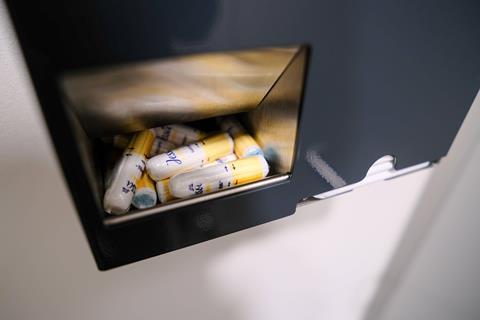The chemical industry and universities are doing more to give chemists what they need to manage their menstrual health

When Sofia Olendraru started her undergraduate chemistry course at the University of Oxford, UK, she found herself spending up to six hours in the lab with minimal breaks. ‘So if you get your period and you don’t have period products on you, you don’t have time to go out and buy some,’ she says. Those available in the bathrooms required a pound coin to purchase: ‘So I lobbied to get them for free.’
This is just one example of how menstruation can affect an individual’s experience of being a chemist. Offering support for menstrual, perimenopausal and menopausal health isn’t just helpful for individuals but also the sector as a whole.
‘A diversity and inclusion issue is never just a diversity and inclusion issue,’ says Ana Lopez, who has been working in equality, diversity and inclusion (EDI) across a range of industries since 2016. ‘It’s just a way to bring to the surface a business issue. If a woman does not have the facilities to take care of herself during menstruation then that’s a safety issue – that’s a person that cannot do their job.’
Menstruation and menopause can affect individuals in varying ways. Some people have few or no symptoms, while others experience severe health difficulties such as debilitating pain for menstruation, flooding in perimenopause, or a paralysing lack of confidence during menopause. ‘We know that menstrual health and menopause are still quite stigmatised topics, so there needs to be more awareness and openness,’ says Chiara Cocco, a postdoctoral researcher at Heriot-Watt University, UK, who is exploring the impact of menstrual health and menopause across the research and innovation sector, as part of a wider initiative called the EDI Caucus.
Raising awareness can take a variety of guises – from menopause cafes, to normalising the ability to turn off your camera during a hot flash. In early May, BASF launched a programme focused on menopause, aimed at supporting employees worldwide. The initiative will include informational resources, expert lectures and discussions that allow participants to share experiences. ‘When it comes to menopause I see some companies in the chemical industries that are creating more awareness of the possible barriers for advancement that it can have,’ says Lopez.
Normalising conversations
Olendraru is one of a team of current and former Oxford chemistry students who host a podcast called Periodically, which discusses how periods have affected their studies and work. She and her co-hosts have found sharing their experiences has helped to normalise talking about menstrual health and led to wider conversations in the academic sector. Episodes of Periodically are now used at the University of Oxford to help demonstrators understand issues students might face.
The physical environment of a workplace can also have a marked effect on an individual’s ability to work effectively. Easy access to toilets is not always a given in a male-dominated industry. Initiatives such as having dark coloured uniforms, a quiet room, a space for washing and provision of period products – the latter, required by law in Scotland – can also offer much needed support.
Although physical environments can seem hard or costly to change, there are ways to make existing spaces work better. A toilet with multiple cubicles can be changed to a private bathroom using a one-in, one-out system, providing extra privacy to those who need it, says Cocco.
There is no one-size-fits-all solution
Core structural and policy support is also needed to protect employees. Several countries, such as Spain, have introduced menstrual leave policies. However, without a culture that supports and understands menstrual health, it can be seen as a way to shut out women from the workplace. Other policies include flexible working, or having a buddy system so one person is not solely responsible for a piece of equipment or experiment with no breaks. This doesn’t just help those experiencing menstrual or menopausal health issues, but employees across the board.
Ultimately there is no one-size-fits-all solution. If you’re seeking support in your workplace, the key is to persist. Look at your company’s leave and EDI policies. Although wider change can be slow, you can begin by talking to your line manager, supervisor or a trusted colleague.
‘Find people who are allies to your cause, who want to help you, because they are there,’ says Elba Feo, a PhD student at the University of Technology Sydney, Australia, and one of the Periodically team. ‘Sometimes they’re not necessarily people you most expect – we’ve had a lot of male staff who’ve been very supportive of the project.’
‘The other thing is to find your community of people. Being able to talk to other members of Periodically helped me so much. I spoke about issues with them that I’ve never spoken to other people about, because suddenly it felt like people understood and wanted to listen and cared. I think that makes such a difference.’

















No comments yet